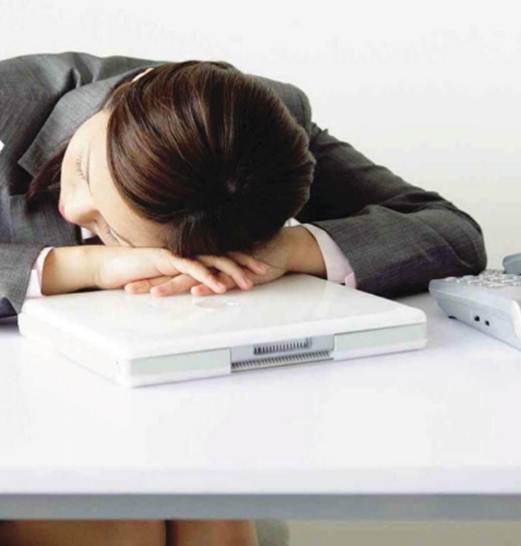Hooked on long days and even longer
bouts of stress?
Do you routinely skip your lunch break?
When you go to sleep, do you dream of spreadsheets? Do you feel naked without
your iPhone? If you answered an emphatic yes to these questions, chances are
you’re Bonafide workaholic.

Are
You Headed For A Burnout?
In our fast-paced, plugged-in world,
there’s a fine line between wanting to get ahead in your career and being
addicted to your job. A Norwegian university has devised a Work Addiction Scale
to distinguish between employees who are simply ambitious and those who ate
genuine workaholics. The scale assesses the kinds of behaviors all addicts
share, from freeing up time for their addiction (work) to denying it’s a
problem at all.
‘Growing globalization means it’s necessary
for some companies to be in constant touch with colleagues in different time
zones,’ says Dr. Cecilie Andreassen, who devised the Work Addiction Scale.
‘These factors, and others, contribute to more employees who are driven to work
excessively and compulsively – the definition of an addict.’
And all that work is taking a serious toll
on our wellbeing. A US study of Generation Xers found 69 per cent think their
job damages their health, 46 per cent believe it harms their relationship with
their partner and 50 per cent reckon it means a satisfying sex life is
completely out the window.
If you’re concerned that you might be
headed this way (or are already there), follow our expert advice on how to make
your work, er, work for you.
Red flags
With deadlines looming daily, you might
have missed the warning signs that a burnout is on the horizon. Take a minute
or two to consider how you’re actually feeling, says life coach Louise
Presley-Turner. ‘Look out for red flags like not having time to eat or even go
to the loo; feeling anxious and panicky all the time; consistently working till
10pm; using cigarettes or alcohol to help you relax, and finding it difficult
to sleep because your head is spinning.’
And, while workaholics tend to ignore any
suggestions from family and friends to clock off, it’s important to listen to
the people who know you best. ‘If your friends and family mention they don’t
see you as often as they used to, you’re always preoccupied with work (even
when you’re doing non-work activities) and you feel guilty if you’re not
working, it’s time to address the lack of balance,’ says performance
development consultant Charlotte Austin.
Balancing act
Striking a healthy work/ life balance is
easier said than done, but it’s crucial for your health, your happiness and
your relationships. ‘You can’t put all your energy into one area of your life
and expect a balance to exist,’ warns Charlotte. ‘If you want to maintain
healthy relationships, you need to really nurture them.’

Striking
a healthy work/ life balance is easier said than done, but it’s crucial for
your health, your happiness and your relationships
As well as finding time to chill out with
your mates, it’s also important to make time for yourself. ‘Build some downtime
into your weekly schedule,’ says Louise. ‘Make an appointment with yourself to
read, ride your bike, run or watch TV.’ And stick to it!
In the long-term, ‘Meditation will help you
relax and de-stress,’ Louise says. ‘It helps you to understand yourself better
and connect with what’s important to you.’ See it as an opportunity to dig deep
and consider if your work, and work schedule, is truly making you happy or
whether it’s time to lighten up.
How to make a change
The good news? You don’t have to hand in
your notice to quit your work habit, just make an effort to change the way you
work to reduce the load. Try these top tips to become more efficient and wave
goodbye to stress.

How
to make a change
Plan
‘Planning is absolutely key,’ says
Charlotte. ‘Organise your working day into time boxes, and don’t forget to
factor in at least an hour of “reactive time” each day to deal with any
unpredictable requests and emails that require immediate attention.’
Delegate
‘Some of the world’s most successful people
have learnt the art of delegation,’ says Louise. Entrust others with the tasks
you set and accept the fact that you can’t do everything – you’re not
superhuman!
Just stop
This sounds simple but if you’re feeling
your blood pressure rising, step away from your desk for a time out. ‘Breathe
in as deeply as you can for a count of five and release, then repeat five
times,’ advises Louise.
Move around
‘You should be doing about 30 minutes of
exercise each day,’ says Charlotte. ‘This release of feel-good endorphins will
help keep your mind and body healthy.’ If your to-do list is longer than
Cameron Diaz’s legs and you think you simply can’t find time to exercise,
remember that keeping fir will actually make you more done by boosting your
energy levels and increasing your ability to concentrate,’ says Louise.
Step outside
‘Natural daylight is good for your mental
health,’ says Charlotte, ‘so make sure you get some every single day.’ Don’t
ask someone to pick you up a sandwich while you stay glued to your screen – the
five minutes it takes to pop out won’t leave you lagging behind. Go to Pret
yourself and enjoy the fresh air on your walk there.
Get some perspective
Feeling overwhelmed? Take a minute to give
yourself a reality check. Ask yourself if filing that report or meeting that
deadline is as crucial as you think. ‘Remember that it’s only a job!’ says
Louise.